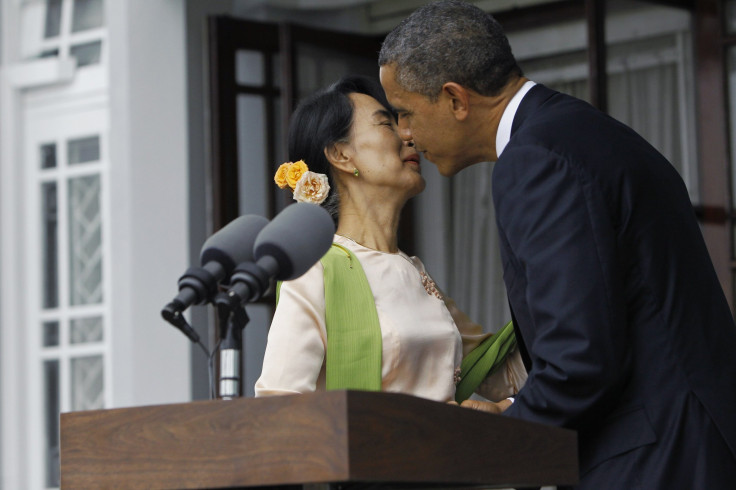Obama Visits Myanmar, Hails Country’s Shift To Democracy

In his historic visit to Myanmar Monday, U.S. President Barack Obama hailed the country’s shift to democracy and pushed for further reforms.
Obama, the first serving U.S. president to visit the former pariah nation, met Myanmar President Thein Sein and the opposition leader Aung San Suu Kyi before heading to Cambodia where he is scheduled to attend the ASEAN summit.
"I've shared with him the fact that I recognize this is just the first steps on what will be a long journey," Obama told reporters with Thein Sein standing near him.
"But we think a process of democratic and economic reform here in Myanmar that has been begun by the president is one that can lead to incredible development opportunities," he said.
Obama used the name Myanmar – the name preferred by the Myanmarese government -- to refer to the host country rather than its old name -- Burma, normally used in the United States.
Locals had lined up the streets with small American and Burmese flags and chanted “Obama, Obama” as the Obama’s motorcade passed the streets of former capital Yangon.
During his meeting with Obama, Thein Sein reiterated his government’s commitment towards reforms and expressed the hope that bilateral relations between both the countries would progress.
“For the past 20 years there were some disappointments and obstacles in our diplomatic relations. Our bilateral relations are progressing and I would like to indicate our commitment to strengthening bilateral relations in the years to come,” Thein Sein said, Bloomberg reported.
Obama’s visit assumes importance as both the countries look towards greater cooperation in trade and economic front. The U.S. and the West have softened their sanction on Myanmar following the initiation of the democratic process in the country a year ago.
Obama’s visit, which many international groups dubbed as premature, was primarily intended to show the U.S. appreciation for the reform process in the country.
Rights groups had cautioned Obama that the prisons in the country still held hundreds of political dissidents and the ethnic clashes between the Buddhist majority and the Muslim Rohingyas continued.
The military-backed civilian government took the reign of the nation in 2010, ending a five decade-long military rule. Thein Sein kick started economic and political reforms a year ago, leading to the release of opposition leader Aung San Suu Kyi from decades-long house arrest.
As a goodwill gesture ahead of Obama’s visit, the government had released 66 prisoners, most of them dissidents of the government and the former military junta.
Though Obama chose not to make any direct reference to the ongoing violence, he stressed on the need to attain international standards for human rights in the country.
"During our discussions, we also reached agreement for the development of democracy in Myanmar and for promotion of human rights to be aligned with international standards," he said.
"I stand before you today as president of the most powerful nation on earth, with a heritage that would have once denied me the right to vote. So I believe deeply that this country can transcend its differences, and that every human being within these borders is a part of your nation's story," he added.
Thein Sein, in a letter to U.N. Secretary-General Ban Ki-moon last week, promised to contain the violence targeted at the Rohingyas and assured that he would tackle the root causes, the United Nations said in a statement.
After his meeting with Thein Sein, Obama met Nobel Peace Prize laureate and long-time opposition leader Aung San Suu Kyi at her lakeside residence. Suu Kyi, who led the struggle against the military rule, was elected to the parliament in the last elections.
© Copyright IBTimes 2024. All rights reserved.






















